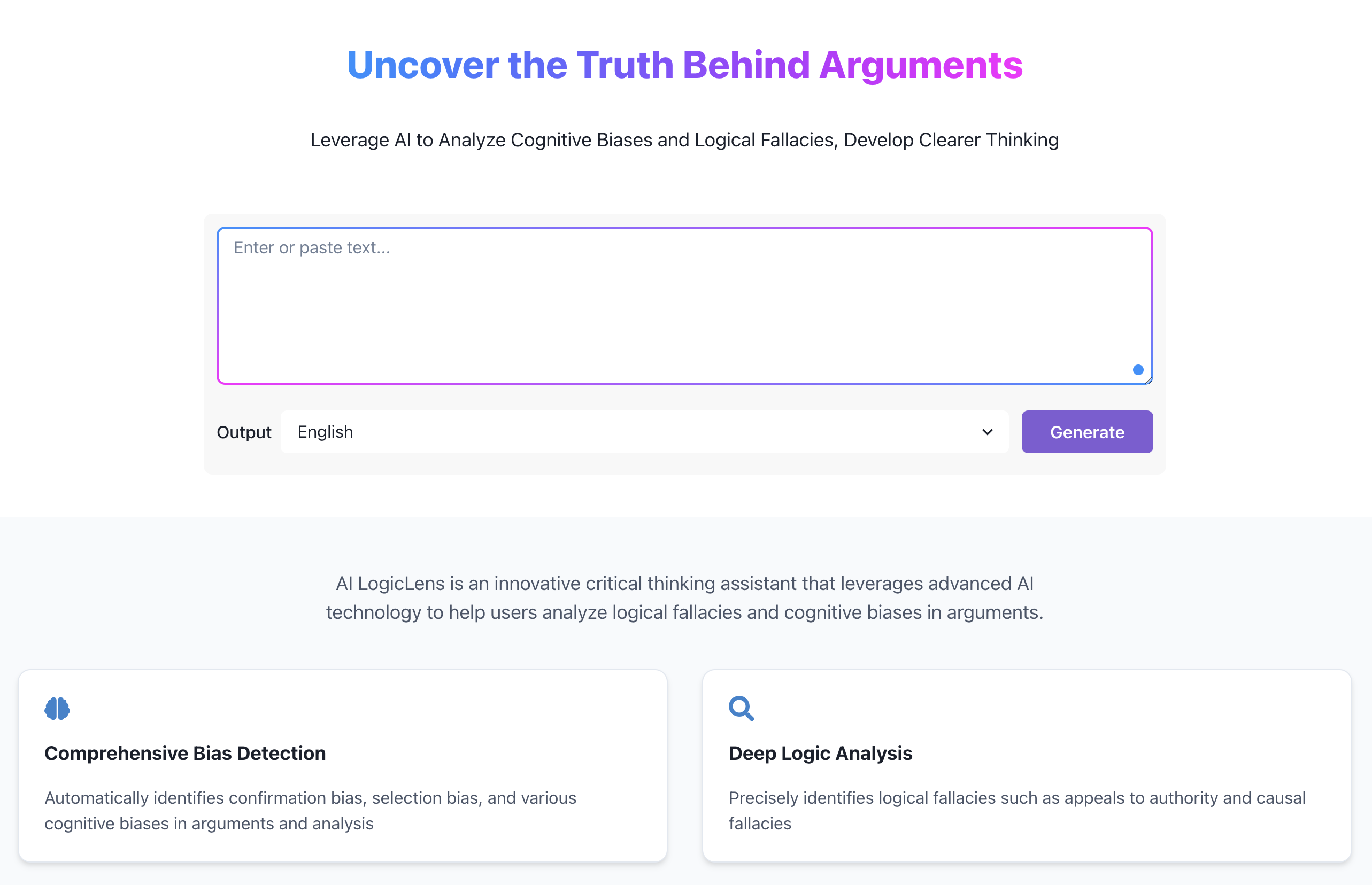In a world overflowing with information, distinguishing truth from persuasive rhetoric has become increasingly challenging. Arguments that sound convincing often hide logical flaws and cognitive biases that can lead us astray. This is where FunBlocks’ AI LogicLens steps in as a groundbreaking tool for anyone seeking clarity in their thinking and decision-making.
The Critical Thinking Crisis
Before diving into what makes LogicLens so powerful, let’s address a growing problem: our collective struggle with critical analysis. From academic papers to business reports and daily news articles, we’re constantly exposed to arguments that appear sound but may be built on shaky logical foundations. Even the most careful thinkers fall prey to cognitive biases that distort their reasoning.
The consequences? Poor decisions, flawed research, and the perpetuation of misconceptions. These issues affect not just academics and professionals but anyone trying to navigate our complex information ecosystem.
Introducing AI LogicLens: Your Personal Logic Analyst
FunBlocks’ AI LogicLens functions as an experienced logic analyst that helps users identify and understand the underlying structure of arguments. Unlike traditional tools that focus solely on grammar or style, LogicLens delves deeper into the quality of reasoning itself.

Core Capabilities That Set LogicLens Apart
Comprehensive Bias Detection
One of LogicLens’ most powerful features is its ability to automatically detect various cognitive biases in arguments. It identifies:
- Confirmation bias: When evidence is selectively gathered to support pre-existing beliefs
- Selection bias: When data sampling methods systematically favor certain outcomes
- Other cognitive distortions: That subtly influence how we process information
The tool doesn’t just flag these biases—it explains how they might be affecting the conclusions drawn.
Deep Logic Analysis
LogicLens precisely identifies logical fallacies that often go unnoticed, including:
- Appeals to authority (when claims rely on expertise rather than evidence)
- Causal fallacies (when correlation is mistaken for causation)
- Other reasoning errors that undermine the validity of arguments
Each identified fallacy comes with an explanation of why it weakens the argument’s structure.
Multi-dimensional Perspectives
Perhaps most valuable is LogicLens’ ability to provide balanced alternative viewpoints. It supplements missing context and helps users see beyond their own perspective—a crucial step in developing truly comprehensive understanding.
Visual Mind Mapping
Complex logical relationships can be difficult to grasp in text alone. LogicLens solves this by presenting its analysis in structured, visual mind maps that make relationships between concepts immediately clear and accessible.
Real-World Applications
LogicLens isn’t just a theoretical tool—it has practical applications across various domains:
Academic Excellence
For researchers and students, LogicLens serves as an invaluable partner in strengthening scholarly work. It helps:
- Analyze research papers for methodological soundness
- Identify potential biases in study design
- Strengthen arguments before publication or submission
- Improve peer review processes
Business Decision-Making
In the business world, where decisions can involve millions of dollars, LogicLens offers:
- Evaluation of business proposals for logical coherence
- Analysis of market research for hidden biases
- Assessment of strategic plans for comprehensive consideration of factors
- Improvement of team decision-making processes
Media Literacy
For anyone consuming news and information, LogicLens provides:
- Assessment of news coverage for potential biases
- Identification of logical fallacies in reporting
- Evaluation of balanced reporting
- Tools to become a more discerning media consumer
Personal Growth
Even in everyday discussions and decision-making, LogicLens helps users:
- Recognize their own cognitive biases
- Make more informed personal decisions
- Improve the quality of their arguments
- Develop stronger critical thinking skills overall
Who Benefits Most from LogicLens?
While anyone interested in clearer thinking can benefit from LogicLens, it’s particularly valuable for:
Academics & Researchers
LogicLens helps review research papers and academic arguments with enhanced analytical precision, potentially improving the quality of published work and advancing fields of study.
Students & Learners
For those developing their intellectual toolkit, LogicLens serves as both teacher and guide, helping improve critical thinking skills and academic writing.
Professionals & Decision Makers
Those responsible for evaluating policies and proposals can use LogicLens to ensure their analysis is comprehensive and logically sound.
Beyond Simple Analysis
What makes LogicLens truly revolutionary is that it doesn’t just identify problems—it helps users grow. By explaining biases and fallacies in context, it transforms each analysis into a learning opportunity. Over time, users develop stronger critical thinking skills they can apply even without the tool.
The Logical Next Step
In an era of information overload and algorithmic echo chambers, tools like AI LogicLens aren’t just convenient—they’re essential. By helping us see through rhetorical smokescreens and identify our own blind spots, LogicLens empowers us to think more clearly and make better decisions.
Whether you’re writing a research paper, evaluating a business proposal, consuming news, or simply trying to make better personal decisions, LogicLens offers a powerful framework for uncovering truth behind arguments.
Ready to strengthen your critical thinking and make more informed decisions? Visit FunBlocks.net to experience AI LogicLens for yourself and transform how you analyze information.
Leave a Reply